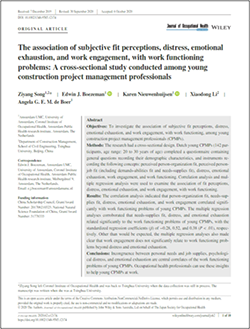#0094 The association of subjective fit perceptions, distress, emotional exhaustion, and work engagement, with work functioning problems: A cross‐sectional study conducted among young construction project management professionals

Stress Test: How Does Stress Affect Work Functioning in Young Professionals?
Construction management is known to be a physically and mentally taxing job, owing to the rigorous deadlines, long work hours, and role conflicts. The consequent rise in work stress and emotional exhaustion among young construction project management professionals (CPMPs) affects their health-related capacity to meet work demands, known as work functioning. Prior research conducted in workers on the influence of personal, health-related, and work-related factors on work functioning has shown conflicting results. Due to the lack of data in professionals, we conducted a study between October 2018 and January 2019 to understand the relationship among various work functioning predictors among Dutch CPMPs.
Our team from the Coronel Institute of Occupational Health at the University of Amsterdam enrolled about 142 young CPMPs aged between 20 and 30 years from a Dutch construction sector stakeholder organization. These CPMPs completed questionnaires focused on subjective fit perceptions, distress, emotional exhaustion, and work engagement. The different fit perceptions evaluated were the compatibility between the individual and the organization, the demands of a job and an individual’s abilities, and the needs of an individual and the rewards the jobs supplied in return for their work. Work engagement described the vigor, dedication, and absorption amongst professionals. The outcome measure was work functioning, and higher score for work functioning implied a worse outcome.
We found that 22.9% of the participants reported severe stress at work, while 40.4% reported more than average emotional exhaustion. In particular, we found that an incompatibility between the participants' needs and the perceived reward from their jobs, higher psychological distress, and greater emotional exhaustion resulted in higher work functioning scores, implying poorer outcomes.
Notably, our study is the first to address the central issues in work functioning among young workers, and these findings can be used by health professionals to provide better help to this demographic.

Link to the original journal article:
https://onlinelibrary.wiley.com/doi/10.1002/1348-9585.12174
Title of the paper:
The association of subjective fit perceptions, distress, emotional exhaustion, and work engagement, with work functioning problems: A cross‐sectional study conducted among young construction project management professionals
Authors:
Ziyang Song, Edwin J. Boezeman, Karen Nieuwenhuijsen, Xiaodong Li, and Angela G. E. M. de Boer




